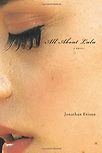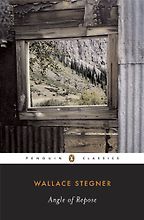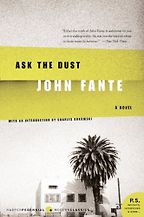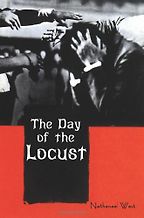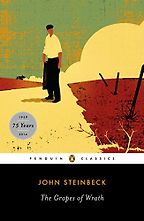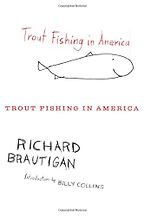Are these all American classics? Of the five, I’ve only read one, so I was quite excited to think there might be all these other great novels out there I hadn’t read yet.
I think everyone would agree Angle of Repose and The Grapes of Wrath are. I’m not sure about Trout Fishing in America, Ask the Dust and The Day of the Locust. They’re classic in a way, but they’re not in that big American novel canon. Trout Fishing in America is just goofy. There is something quintessentially Western about it though – 1960s Western.
You were born in California, but now live in Washington State. What is it that attracts you to the American West?
I’m actually fifth-generation Californian, though I’m a confirmed Washingtonian now. We moved here when I was eight and then I moved back to California for college so I’ve been up and down the West Coast my whole life. [Washington State] is home for me now. Going back to the books, Angle of Repose is about generations settling in California. In fact, four out of the five books I chose are Californian-Western novels.
The American West always has been, and remains, a place where Americans go to reinvent themselves. These days, we’re not doing westward expansion and homesteading anymore, but new movements and reinventions of old forms tend to pop up here, things like craft brewing or co-op farming. The West still harkens to a sort of rugged individualist.
The Western American novel is a broad term, but one thing that really characterises it for me is that landscapes are never far out of the picture. There always seems to be some element of the landscape and how it shapes the people and how they shape it. Even in an urban novel like Ask the Dust, the desert taking over the city is a big theme throughout the book. It’s named after the dust that comes up off the winds that blow in from the Santa Ana, so even in a 1930s urban novel you feel the landscape closing in on you.
In September I drove from Salt Lake City to Jackson Hole and up to Yellowstone to go camping, and the landscapes are amazing out there. I’m not surprised that they form the backdrop to so many novels.
The climax of my next novel happens at Yellowstone. It’s an amazing place. Equally so is the Olympic Peninsula that I live in, where [my novel] West of Here is set. I just bought a cabin up in the mountains too, so I’m even closer now. It’s really humbling and mind-boggling and wonderful. There’s a bluff from my house where I can look into the Olympic interior and I can look the other way and I’m looking all the way out over the Strait of Juan de Fuca to Canada. The vistas in the West are just unparalleled.
There are also new themes emerging on the West. What West of Here deals with is that more and more we’re having to face our early mistakes, many of which are ecological, and be accountable for early institutionss.
West of Here is about a fictional town on the Olympic Peninsula. Tell me a bit about why you wrote it.
It’s based on Port Angeles. What I wanted to do was write America’s story, but couched in the light of one small town, and Port Angeles is the quintessential American story. In 1890, when the novel begins, it’s the last frontier in the American West, technologically, culturally, in all sorts of different ways. All these things are coming to a crescendo, and it’s embodied in this one little town, this town that is struggling to be Seattle, because Seattle has just burned to the ground. It’s about a town that has to come to terms with its early mistakes.
Ecologically speaking, the dam is the central metaphor of the novel. The first part of the novel is about the creation of the dam, and then the later part of the novel is about the dismantling of that dam, and its legacy. If I had a thesis statement about what I was trying to do it’s that I wanted to frustrate and subvert a lot of accepted notions about what we call history. We tend to gravitate towards this wide-angled lens, linear storytelling that concerns itself with great men and legislation and dates and events. I wanted to show, in an Emersonian way I guess, how every person contains the whole of human history. I wanted to create a living history.
I’ve made it sound very convoluted. It’s actually a really playful novel. I’m jumping back and forth in history. Plus there’s Big Foot in it.
So do you romanticise the past?
No, I don’t. But we’re so unsentimental and judgmental looking back now, that one of the things I had to do was try not to be too harsh on our forebears. It’s really easy to stand here and say, “Thanks for destroying the environment with your greed.” But buried in this idea of Manifest Destiny, beyond all the led-by-God and rape and pillage, is a pretty heavy idea of levelling the classes for the first time in human history and offering equal opportunities. Anyone with a pickaxe and a shovel and a good back could go homestead 140 acres in the American West. That was unprecedented in world history. I found myself having to be a little bit more sympathetic. It was hard for them to see something as a resource that looked endless. In 1860, when people came to the Olympic Peninsula, it was impossible to imagine ever even making a dent in all that timber. Millions and millions of acres. I don’t romanticise the past, I just wanted to defend it I guess.
Let’s go through your books. Your first choice is Wallace Stegner’s Angle of Repose, a Pulitzer prize-winning novel from 1972. Have all Americans heard of this book? What do you like about it?
I’m just astounded by the scope and magnitude of the novel, and the landscape described. It’s the story of an ailing professor near the end of his life. He’s in a wheelchair and he’s becoming a bitter man. He’s writing his family history, and he goes back generations to the movement west. Meanwhile there is this fore-story going on, which is this great generational battle between himself, an older white male gentleman, and this young, strong-headed, hippy caregiver. It’s just amazing. It’s one of the 20 best American novels ever written.
Where is he – in California?
Yes, he’s in north-central California. A lot of it takes place further east of the Sierra Nevada. His home is where they finally settled, but the book moves west. It’s been a while since I’ve read some of these books. I chose them because they still cast a shadow.
One of the author’s pet peeves was the myths that are perpetrated about the American West in books and movies. Do you agree with him on that?
Totally. It was part of a larger movement culturally that was going on in America at that time. You had the revisionist Westerns in cinema too. A lot of people in the 1960s and 70s were looking at the traditional myths and questioning them. Now, the literary world is so rife with the Southern Gothics, the Cormac McCarthys and the like, I almost feel that to subvert it now you have to go back in the other direction.
Tell me about your next book, Ask the Dust, which was published in 1939 and is set in Depression-era LA.
I won’t say this is the book that made me want to be a writer, because I always wanted to be that, but it solidified my insistence on becoming some hopelessly young, starving misfit awash in an urban landscape somewhere, working my ass off, just really throwing my heart out there and getting it kicked around. Ask the Dust is just a really powerful book for me. It’s a chronicle of the immigrant experience in America in the 1930s.
The main protagonist, Arturo Bandini, is an Italian-American?
Yes, he’s first generation Italian-American, so it’s about that first generation of immigration experience, wanting to outrun the shadow of your ancestors, and truly be American. One of the very powerful ways that that manifests itself in the story is Arturo’s attitude towards the Mexican girl that he’s really in love with. He demeans her, and looks down on her and calls her a dirty Mexican to elevate himself. There’s just something so raw and true about it. He’s quite quixotic, full of fear and arrogance. The prose of the novel is pretty straight ahead, but just so muscular and very 1930s.
And it’s semi-autobiographical?
Yes, Arturo Bandini is a pretty thinly veiled John Fante.
Next up, also from 1939, is Nathanael West’s The Day of the Locust.
To me this is the quintessential LA novel. It’s about the film industry in its heyday. What makes it Western is that it’s set in the West, and it’s all about this idea of possibility. It’s about all these people uprooting themselves and the Hollywood dream they were sold. This book is where the name Homer Simpson comes from: He’s an everyman character who moves out from Nebraska. It’s hilarious and macabre, and it’s so modern in its tone and cadence. Just the prose, the style, the observations are very modern for 1939. As a side note, I’m pretty sure Nathanael West was killed [aged 37] in a car accident driving to F Scott Fitzgerald’s funeral.
And the savagery of the Hollywood dream, even though this book is set a while back, it still rings true today?
Oh yes. If anything, it’s spread like a rash. There is so much savagery involved in any dream that sells fame, which is something that obviously doesn’t happen to everybody. Hollywood is a tough place. I went there as a young writer in my twenties and optioned a couple of projects, but really got my ass kicked around town and found it to be not a real positive experience. It was a shark tank compared to any other industry I’ve ever worked in, and I’ve worked in radio, literature, in advertising. It’s just so competitive.
Let’s move on to John Steinbeck, and The Grapes of Wrath.
This is the great American novel for me—the humanity, the landscapes, the progressive and political and social ethos of the novel, not to mention the amazing characters. To my mind, with his characters and also because of his huge output, Steinbeck is the American Dickens, at least in term of social consciousness. He started beating the political themes a bit louder than I would have liked toward the end of his days, but what I loved about his earlier novels is how the story of human inequity is totally based on the humans.
Support Five Books
Five Books interviews are expensive to produce. If you're enjoying this interview, please support us by donating a small amount.
It’s an amazingly powerful story of people trying to reinvent themselves in an environment that was stacked very much against them. In that era, the robber barons had such a hold on the West, they were truly luring people out there with the dream, just so that they could create a workforce that was too big and then hire cheap labour. It’s the story of American labour, too. The themes are just so big. It’s not just about the West, but it’s hard to take it out of the context of the West.
It does seem to be still very much relevant today. In fact John Kerry, in his Five Books interview, chose it as one of his top five books on progressivism.
I feel exactly the same way. Part of my ambition with West of Here was to do something like that. Probably I failed on a number of levels, but the central question of the novel is, what is our new American idealism? Manifest Destiny didn’t work out, but there’s still that kernel, there’s still that spirit – where do we go now we’ve gone as far west as we can, both figuratively and literally? It’s sort of a call to arms.
I read The Grapes of Wrath about 10 years ago now, but every time I think of it I can almost feel the dust coming off the dry land around me. The landscapes are very vivid.
There are two landscapes in the novel, and they work the opposite of the characters’ hopes. They’re leaving this cracked, scraggly, scorched earth with all these hopes for a brighter future, and they move through this desert and they move into this land of plenty, this Eden, and what’s waiting for them there is completely less than they expected. Intuitively, that’s a really powerful thing working on the reader, this idea that no matter how bright this thing looks, here’s the reality underneath it.
Tell me a bit about Trout Fishing in America. You said at the beginning it’s kind of goofy?
It’s a bit of an oddball choice. I should start by saying this novel was written in 1967.
Is it about trout fishing?
No. Yes. No. It is and it isn’t. The book is really surreal. At one point one character says to another, “Pardon me, I thought you were a river.” That should give you an idea. Clever usually bugs me, if it’s clever for clever’s sake, if it doesn’t get to something deeper. What distinguishes Brautigan is that, despite this goofy sensibility and his wit, I always feel this clear-eyed moral vision that I can trust. Also, I just connected with his deep appreciation for the landscape – it’s all about trout streams. It’s about urban squalor, too. It’s got a lot of stuff for a thin, wacky book of poetry-prose.
What’s the point he’s trying to make?
I can’t even honestly tell you that. I don’t know. I just know it worked on me. A love of nature and a love of humanity, I guess, those are the elements I carry around with me.
If someone were reading this in England and thinks, “Oh, I really do want to go and see all these great landscapes,” where would you tell them to go to get a sense of what the American West is all about?
The National Parks are a great place to start – Glacier National Park, Yellowstone National Park, Olympic National Park. I would recommend doing it off-season, if you can. There’s a reason they were preserved as national parks – pretty much most of the really incredible wonders of the West have been turned into national parks. The Grand Canyon as well.
What about things off the beaten track that help define the American West?
Get off the interstate. Just try to follow the old Route 66, which is all broken up by interstates now. But the little towns off the beaten path, with the little curio shops and wonder caves and pet museums – the kitsch of American roadside attractions is pretty fantastic. I do that stuff with my kid all the time. I love the potato museum in Idaho. There’s really a kind of haunted feel about it, too.
That’s why they made that movie Cars, I guess.
The one for kids, yes. I’m familiar with Radiator Springs. It looks like Monument Valley.
I’ve been to LA and San Francisco. Is Seattle a must-visit too?
Yes, Cascadia, as we call it – the Pacific Northwest in general. If you see Seattle you should see Portland, too. Certainly they have histories as long and as rich as LA and San Francisco. Denver, as well, in a weird way, as a land-locked mountain town on the plateau, is still very Western. They’re just so very different, like the difference between Seattle and Tucson, and yet there is something that ties them together. They’re in the West. They say nobody ever runs East.
Is that true?
Pretty much.
Are there lots of misfits in the West that you come across?
Yes, and the more rural you get, the more Northwest you get – Alaska being the pinnacle of it – the more eccentric and rugged and idiosyncratic you’ll find people.
February 28, 2012. Updated: January 21, 2023
Five Books aims to keep its book recommendations and interviews up to date. If you are the interviewee and would like to update your choice of books (or even just what you say about them) please email us at [email protected]

Jonathan Evison
Jonathan Evison is an American writer and the author of the critically acclaimed novels All About Lulu and West of Here. He lives on an island in western Washington

Jonathan Evison
Jonathan Evison is an American writer and the author of the critically acclaimed novels All About Lulu and West of Here. He lives on an island in western Washington

